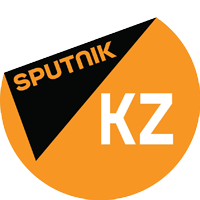On November 27 and 29, 2023, in the Republic of Kazakhstan, experts from Russia, Kazakhstan, Tajikistan, Uzbekistan, Tunisia, Kyrgyzstan, Tanzania, India and Indonesia presented the best practices on the involvement of women in scientific, technological and innovative fields.
The events were held with the support of Rosatom State Corporation within the framework of the international agreement on cooperation in the interests of women signed by the organizers between the Nuclear Society of Kazakhstan Association and the Foundation for Support and Development of Women’s Initiatives “Association of Women in Nuclear Russia”.
The series of events in Astana was opened by the International Forum-Dialogue “Women of Kazakhstan and Russia: Energy of Cooperation for Sustainable Development of High-Tech Industries”, organized to increase the level of women’s innovative activity and implementation of strategies aimed at expanding their participation in high-tech industries and creating conditions for professional development.
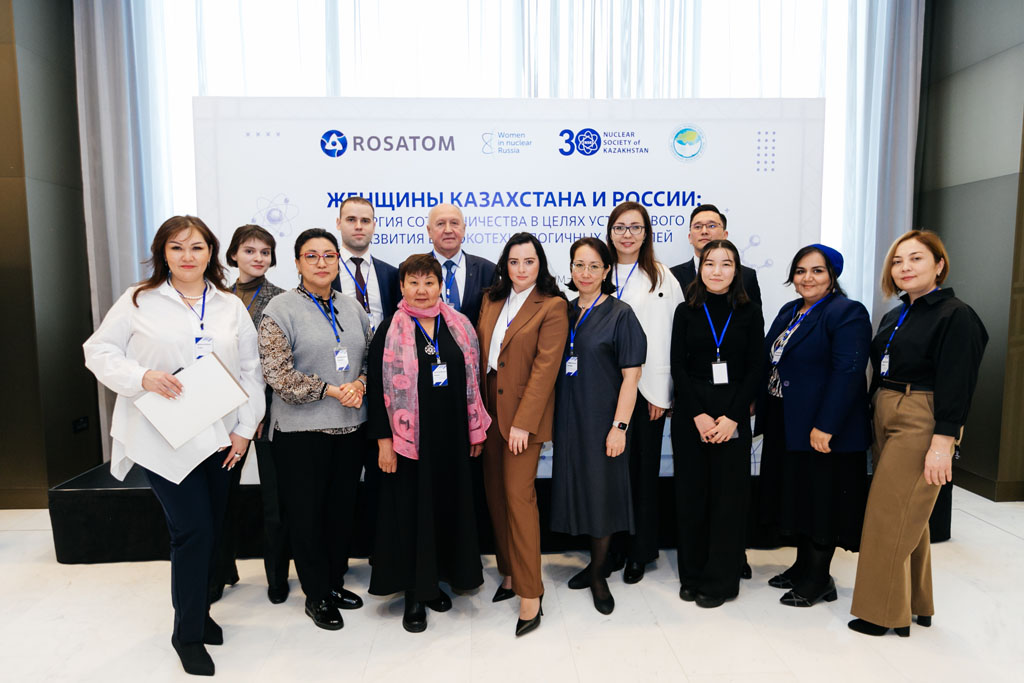
The participants of the Forum-Dialogue presented the best practices for creating a comfortable environment for the professional development of women, stimulating scientific activity, attracting the younger generation to STEM professions, as well as for the development of international dialogue in the scientific and technical field.
Strong partnerships between Russia and Kazakhstan have acquired many new formats, thanks to the active participation of women leaders, Galina Karelova, Chairman of the Council of the Eurasian Women’s Forum at the Federation Council of the Federal Assembly of the Russian Federation, noted in her welcoming speech, – “The partnership of the Association of Women in Nuclear Russia and the Nuclear Society of Kazakhstan is aimed at increasing the level of knowledge of specialists, sharing experience in the implementation of technological and innovative projects, stimulating the interest of young people in science.”.
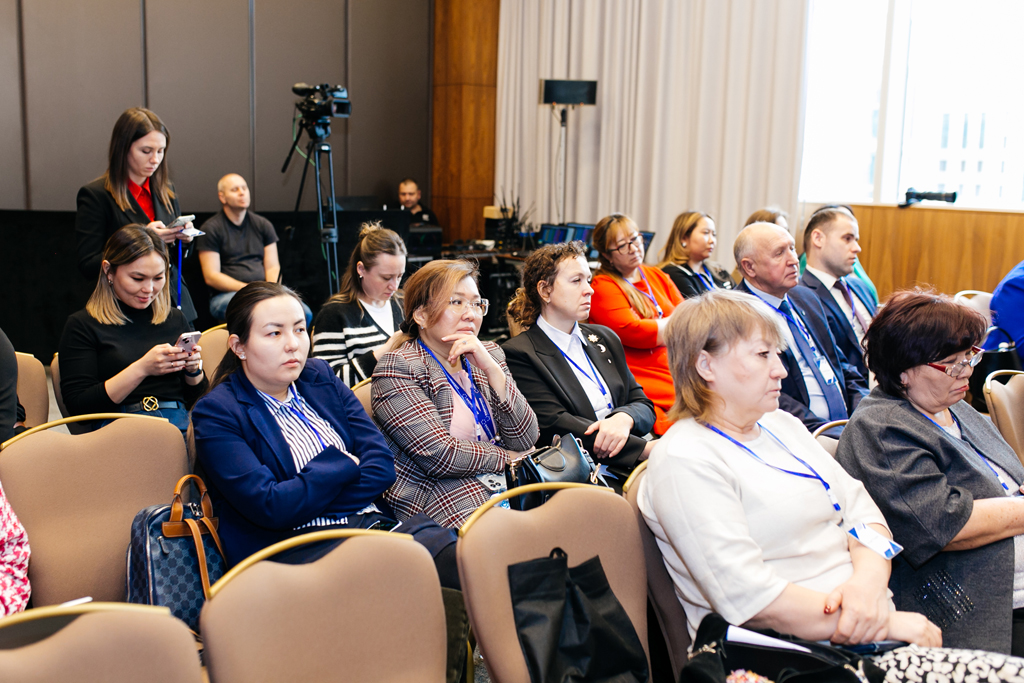
Tatyana Terentyeva, Deputy Director General for Personnel at Rosatom State Corporation, outlined the importance of developing an international dialogue between women of Russia and Kazakhstan in order to expand women’s participation in high-tech industries and thanked the Nuclear Society of Kazakhstan Association for the partnership. Ensuring gender balance in the industry is one of the important areas of Rosatom’s personnel policy. Rosatom’s projects aimed at supporting women in the industry will be included in the document with the recommendations of the IAEA for all member countries. Tatyana Terentyeva also spoke about Rosatom’s programs to support women, such as “the InVisible Force”, in which 1,500 thousand female specialists in the nuclear industry take part, –
«An open dialogue is being built about opportunities for women in Russia and in foreign countries. The Rosatom women’s community has more than 3,000 female nuclear industry specialists from 37 regions and 19 foreign countries, and more than 145 projects have been implemented. An open dialogue between women specialists from Russia and foreign countries is developing. The second important task is the career guidance of young people. Community members conduct mentoring sessions to support female students who have chosen to study in technical specialties.».
Togzhan Seifulina, Director of the Nuclear Society of Kazakhstan Association, noted that the Forum-Dialogue has become a new impetus in the development of international cooperation between women specialists from Russia and Kazakhstan, aimed at exchanging best practices, professional development of women and demonstrating opportunities to unleash women’s potential in the nuclear industry, – “Based on recent research, it has been revealed that in Kazakhstan, less than 50% of girls who have received higher technical education continue this line of work. The Forum presents the best practices of participating companies to address this issue.”
According to research, there is an imbalance in the representation of men and women in the global nuclear industry: in 18 countries around the world, including Russia and Kazakhstan, women account for 25% of the total number of employees in this field, and there are even fewer in senior positions. Therefore, it is important to show girls what opportunities are open to them in the nuclear industry, emphasized Alexandra Ryabykh, co-founder of the Foundation “Association of Women in Nuclear Russia”. Within the framework of common formats of cooperation with international partners, the Association of Women in Nuclear Russia is developing the International Council for the Support and Development of Women in Industry and Technology, which includes women experts from various technological industries in 11 countries. The Council also includes representatives from the Republic of Kazakhstan. Alexandra noted that increasing the participation of women in the economy is critically important for the competitiveness of any country.
Speaker Akhmurzina Lyazzat, Executive Director for Human Capital Development of the KAZENERGY Association, reported on the need to change stereotyping and familiar traditions. According to the Global Gender Gap Report 2023, prepared by the World Economic Forum, Kazakhstan has improved its performance and ranked 62nd out of 146. The speaker said that the KAZENERGY Women’s Energy Club turned 10 years old this year. There are few women in the traditional energy sector – only a quarter of the total professional staff. There are also few women on the boards of directors - 17% and the association is also actively working on this issue. The Women's Energy Club implements projects both to support women in high-tech industries and training programs for young specialists. Kazakhstan has abolished the list of prohibited professions for women, but this creates an important task – to inform girls about the harmfulness of certain professions.
Kozhagildina Zhannat, Director of Social Work Department of NAC Kazatomprom JSC, reported that one of the main priorities of Kazatomprom is gender equality. At the end of last year, the company employed more than 21,000 people, including 3,642 women. The company invests in maintaining the well-being of employees at all levels: financial, physical and social well-being of employees, career development, and mental health. To increase the proportion of women among the leaders in the organization, one of the first events was the “Women’s Leadership Week”, held to demonstrate the opportunities offered to women in the company. Through this program, a women’s community is being created in the company, – “We plan to implement programs on a partnership basis with Rosatom that will help women realize all their accumulated potential.”.
In Kyrgyzstan, in 2020, the “Girls in Science” program was launched with the support of UNICEF, aimed at empowering young people in science, technology, and engineering, said Aida Duishenbieva, President of WiN in the Republic. More than 48,000 students have completed STEM and leadership trainings, and then trained their peers. More than 600 teachers have completed a gender-oriented training course in mathematics, biology, chemistry, physics, and computer science. The course was included in the compulsory program of these subjects; all lessons are publicly available on the website of the Ministry of Education and Science of the Republic. 2,700 girls have completed a mentoring program from successful STEM leaders in the format of master classes and tours of enterprises and ministries, participants met women who have built successful careers in science and technology..
Meetings with schoolchildren and students on career guidance to attract them to the exact sciences are held by WiN Tajikistan. The community unites female specialists working in the scientific and technical field, including in the field of chemical, biological, radiological and nuclear safety, said Mehrangez Muminova, representative of WiN in the Republic. The organization holds essay contests among female students of the republic’s leading universities, where they share their thoughts on women’s leadership in science and technology, and invites girls to participate in practical conferences..
Maira Mukusheva, Director of the Astana branch of the National Nuclear Center of Kazakhstan, shared her experience on how to attract women to science. Among the almost 900 employees engaged in production and laboratory work, 28% are women, 243 of them. And among 34 candidates with an academic degree, there are 11 women. Almost all of them came to science, thanks to the specialists of the center, the girls were “taken under care” from their student days: they hold master classes for them, which immerse them in their chosen specialty in the field of nuclear energy.
Inesh Kenzhina, a specialist in training programs and scientometry, a researcher in the field of nuclear and thermonuclear reactor materials, Doctor of Sciences in nuclear physics at the A. Burkitbayev Kazakh Institute of Energy and Mechanical Engineering, helps girls become more confident in their competencies. She is the supervisor of doctoral students, more than 70% of whom are girls. Together with colleagues, Inesh Kenzhina teaches young people how to write articles in international rating magazines, how to develop an academic career.
The experience in training young people for specialties in the nuclear industry will be used in the creation of an international cluster of nuclear education on the basis of the Obninsk Institute for Nuclear Power Engineering at the Obninsk branch of the Moscow Engineering Physics Institute, said Natalia Ayrapetova, Executive Director of the Kaluga Cluster of Nuclear Technology Association. Today, more than half of the students at the institute are girls. Federal quotas have been introduced to stimulate the interest of young people in studying at the branch.
The role and contribution of women in the development of technology and innovation, as well as the practice of involving female students and the younger generation in STEM, were discussed by the speakers of the session “Women for Sustainable Development of Technology and Innovation” on the eve of the International Monitoring Session “Women in STEM” in Almaty on November 29, 2023.
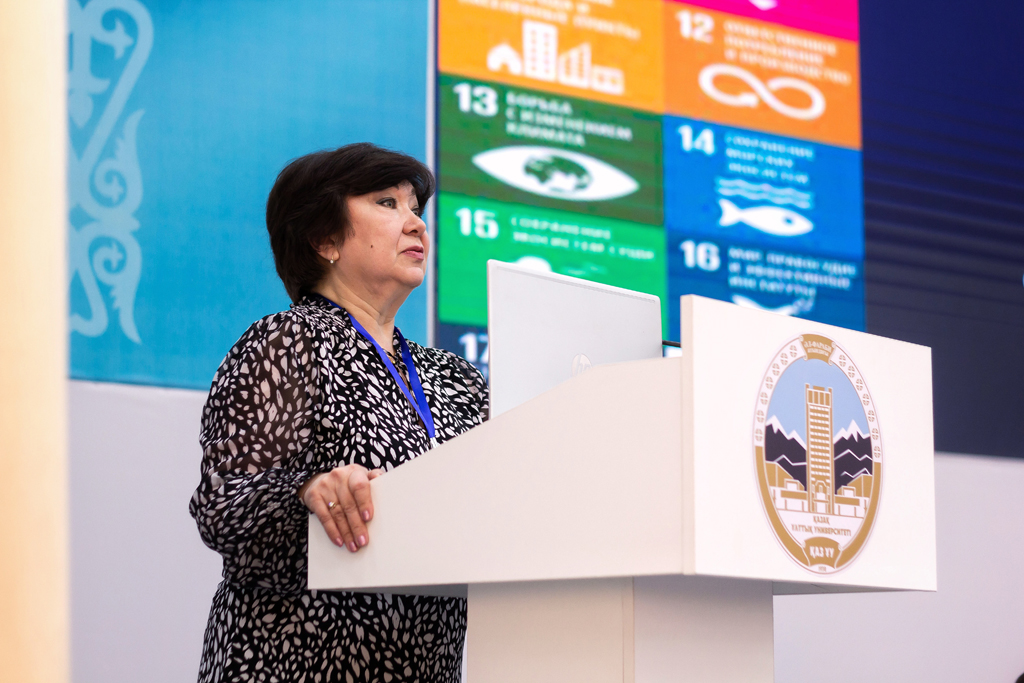
Participants of the International Forum-Dialogue of Women of Russia and Kazakhstan agreed to continue the development of cooperation in the interests of women, namely:
- signing agreements between the Foundation “Association of Women in Nuclear Russia” and WiN Tajikistan and Kyrgyzstan;
- holding bilateral teleconferences of nuclear industry women from different countries on energy and non-energy applications of nuclear technologies, including on the topic of low nuclear power plants;
- development of cooperation between the Association of Women in Nuclear Russia and the Women’s Energy Club of the KAZENERGY Association;
- exchange of experience at scientific seminars for graduate students as part of the development of the Central Asian Network of Women in the Nuclear Industry.
On November 29, at the International Mentoring Session for female students of technical universities “Women in STEM” in Almaty, female experts from industrial, technological and scientific organizations in Russia, Kazakhstan and other countries shared stories of the development of their career trajectories in STEM fields with students of Al-Farabi Kazakh National University and the branch of the National Research Nuclear University MEPhI.
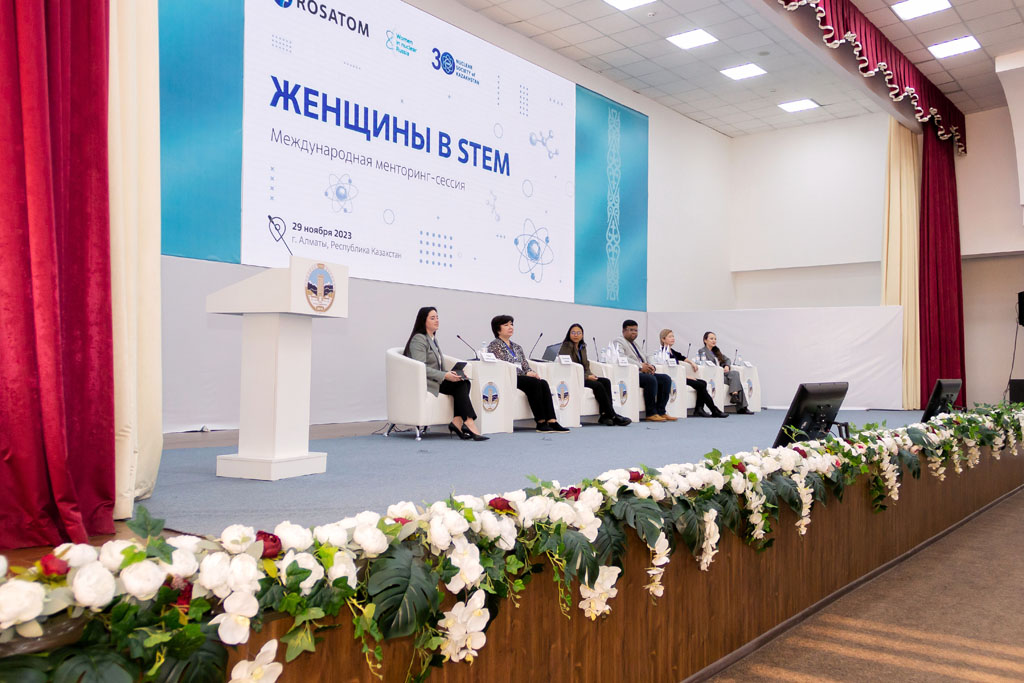
About their personal experience told:
- Tamara Tazhibayeva, Associate Professor of UNESCO Chair, Professor at Al-Farabi KazNU;
- Kenjina Inesh, PhD in Nuclear Physics, specialist in training programs and scientometrics;
- Aizhan Zhakeeva, President of Kazrobotics;
- Mercy Joshua Mwakitalima, Electronics and Telecommunications Engineer, Master’s student in Computer Science and Open Databases at St. Petersburg Electrotechnical University;
- Yulia Soldatova, engineer radiometrician of the first category of the radiation safety group of FSUE Atomflot;
ambassadors of nuclear education:
- Anna Kulsartova, Project Manager of the Nuclear Technology Safety Center;
- Fatah Neba Adila, Ambassador of the Russian Nuclear Education, Secretary of the Russian and East European Section of the Indonesian Oil and Gas Community;
- Irina Sarkisyan, Head of the Project Office, Transfer of Nuclear Education at the Rosatom Technical Academy;
- Najoua Kamoun, Professor at the Faculty of Physics at the University of Tunis and other experts.
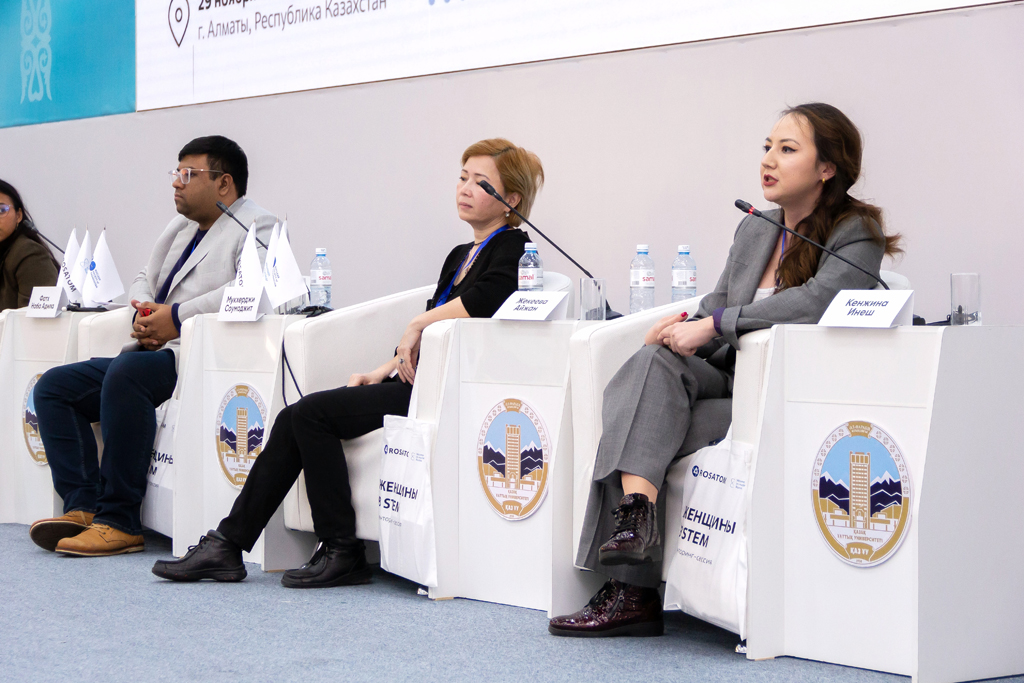
Alexandra Ryabykh, moderator of the Session, co-founder of the Foundation “Association of Women in Nuclear Russia”, told about the research carried out by the Rosatom women’s community – “The overwhelming majority, namely 70% of female students surveyed feel difficulties in building a career in scientific and technical fields. 44% of female students before entering a science and technology specialty faced the stereotype that STEM specialties are for men. 37% of girls before entering the university noted a lack of knowledge about their specialty, 35% were not confident in their abilities. In addition, about 39% of girls have faced discrimination from teachers.”.
Such research demonstrates the importance of motivating the development of female students in STEM through employment assistance, meetings with successful representatives, and popularization of success stories of representatives from high-tech industries.
Using role models of female technology leaders as examples, the participants of the Mentoring Session were presented with examples of how to break stereotypes about girls in science and technology professions and achieve high results in the profession.
High interest of more than 150 full-time participants of the mentoring session from among students of Al-Farabi Kazakh National University and the branch of the National Research Nuclear University MEPhI demonstrated the importance of continuing joint activities on the platform of specialized universities of the Republic of Kazakhstan.
An agreement was reached on the development of long-term cooperation in the framework of popularization of engineering and technical specialties among female students of technical universities in Russia, Kazakhstan and other countries.
Publications of our colleagues:
Several pictures in our gallery.

